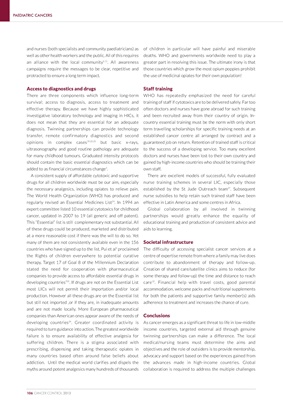
PAEDIATRIC CANCERS
and nurses (both specialists and community paediatricians) as of children in particular will have painful and miserable
well as other health workers and the public. All of this requires deaths. WHO and governments worldwide need to play a
5,11
an alliance with the local community . All awareness greater part in resolving this issue. The ultimate irony is that
campaigns require the messages to be clear, repetitive and those countries which grow the most opium poppies prohibit
protracted to ensure a long term impact. the use of medicinal opiates for their own population!
Access to diagnostics and drugs Staff training
There are three components which influence long-term WHO has repeatedly emphasized the need for careful
survival; access to diagnosis, access to treatment and training of staff if cytotoxics are to be delivered safely. Far too
effective therapy. Because we have highly sophisticated often doctors and nurses have gone abroad for such training
investigative laboratory technology and imaging in HICs, it and been recruited away from their country of origin. In-
does not mean that they are essential for an adequate country essential training must be the norm with only short
diagnosis. Twinning partnerships can provide technology term travelling scholarships for specific training needs at an
transfer, remote confirmatory diagnostics and second established cancer centre all arranged by contract and a
19,22,23
opinions in complex cases but basic x-rays, guaranteed job on return. Retention of trained staff is critical
ultrasonography and good routine pathology are adequate to the success of a developing service. Too many excellent
for many childhood tumours. Graduated intensity protocols doctors and nurses have been lost to their own country and
should contain the basic essential diagnostics which can be gained by high-income countries who should be training their
3
added to as financial circumstances change . own staff.
A consistent supply of affordable cytotoxic and supportive There are excellent models of successful, fully evaluated
drugs for all children worldwide must be our aim, especially nurse training schemes in several LIC, especially those
the necessary analgesics, including opiates to relieve pain. established by the St Jude Outreach team27. Subsequent
The World Health Organization (WHO) has produced and nurse subsidies to help retain such trained staff have been
regularly revised an Essential Medicines List24. In 1994 an effective in Latin America and some centres in Africa.
expert committee listed 10 essential cytotoxics for childhood Global collaboration by all involved in twinning
cancer, updated in 2007 to 19 (all generic and off patent). partnerships would greatly enhance the equality of
This “Essential” list is still complementary not substantial. All educational training and production of consistent advice and
of these drugs could be produced, marketed and distributed aids to learning.
at a more reasonable cost if there was the will to do so. Yet
many of them are not consistently available even in the 156 Societal infrastructure
4
countries who have signed up to the list. Pui et al proclaimed The difficulty of accessing specialist cancer services at a
the Rights of children everywhere to potential curative centre of expertise remote from where a family may live does
therapy. Target 17 of Goal 8 of the Millennium Declaration contribute to abandonment of therapy and follow-up.
stated the need for cooperation with pharmaceutical Creation of shared care/satellite clinics aims to reduce (for
companies to provide access to affordable essential drugs in some therapy and follow-up) the time and distance to reach
developing countries”25. If drugs are not on the Essential List care12. Financial help with travel costs, good parental
most LICs will not permit their importation and/or local accommodation, welcome packs and nutritional supplements
production. However all these drugs are on the Essential list for both the patients and supportive family member(s) aids
but still not imported ,or if they are, in inadequate amounts adherence to treatment and increases the chance of cure.
and are not made locally. More European pharmaceutical
companies than American ones appear aware of the needs of Conclusions
developing countries26. Greater coordinated activity is As cancer emerges as a significant threat to life in low-middle
required to turn guidance into action. The greatest worldwide income countries, targeted external aid through genuine
failure is to ensure availability of effective analgesia for twinning partnerships can make a difference. The local
suffering children. There is a stigma associated with medical/nursing teams must determine the aims and
prescribing, dispensing and taking therapeutic opiates in objectives and the role of outsiders is to provide mentorship,
many countries based often around false beliefs about advocacy and support based on the experiences gained from
addiction. Until the medical world clarifies and dispels the the advances made in high-income countries. Global
myths around potent analgesics many hundreds of thousands collaboration is required to address the multiple challenges
106 CANCER CONTROL 2013